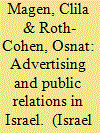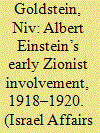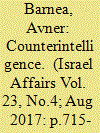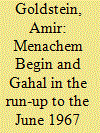| Srl | Item |
| 1 |
ID:
154059


|
|
|
|
|
| Summary/Abstract |
This article offers a comprehensive overview of the evolution of marketing in Israel. By merging the histories of two leading disciplines within the marketing mix, advertising and public relations, it offers a fresh direction in marketing historiography based on the story-telling method and the periodization approach. Studying the evolution of both professions in a synergistic manner leads to several interesting insights that are otherwise overlooked. The article demonstrates how an integrated approach provides a better understanding of the evolution of both fields and substantially enriches the history of the professions within the marketing arena.
|
|
|
|
|
|
|
|
|
|
|
|
|
|
|
|
| 2 |
ID:
154052


|
|
|
|
|
| Summary/Abstract |
This article presents the very beginning of Albert Einstein’s involvement on behalf of the Zionist movement. Although he was familiar with Zionist activists, it was only World War I and the rabid anti-Semitism attending it that led him to rediscover his affiliation with the Jewish people and to subscribe to the Zionist solution to their misery. Einstein tried to combine his support for the national Zionist ideals with the universal worldview to which he adhered from time immemorial, gradually coming to support establishment of the national home in Palestine as a solution for ‘The Jewish Problem’.
|
|
|
|
|
|
|
|
|
|
|
|
|
|
|
|
| 3 |
ID:
154063


|
|
|
|
|
| Summary/Abstract |
The post-World War I partitioning of the Ottoman Empire, especially the League of Nations’ appointment of Britain and France as the mandatory powers for Palestine and Syria respectively, influenced the lives of the inhabitants of Upper Galilee. With the district left in December 1919 under French rule, the elated Christians began to avenge themselves on their long-time Bedouin opponents, who for their part supported the short-lived pan-Arab kingdom proclaimed in Damascus by Emir Faisal ibn Hussein of Mecca. With the Upper Galilee deteriorating into internecine strife, the Jews, perceived as supporters of the French, became a target for Bedouin attacks.
|
|
|
|
|
|
|
|
|
|
|
|
|
|
|
|
| 4 |
ID:
154060


|
|
|
|
|
| Summary/Abstract |
This article discusses the differences between strategic intelligence and counterintelligence, a much less researched subfield of the intelligence discipline. One reason for this scholarly neglect is the perception of counterintelligence as highly sensitive due to its preoccupation with internal affairs, considered too confidential for open discussion. Another reason is the apparent lack of understanding of the real contribution of counterintelligence to national security. This article seeks to fill this scholarly lacuna.
|
|
|
|
|
|
|
|
|
|
|
|
|
|
|
|
| 5 |
ID:
154055


|
|
|
|
|
| Summary/Abstract |
This article presents a case study of the economic consequences of 14 wars in the Land of Israel in the last hundred years. For each war, it reviews the direct costs and benefits of the war and the possible changes in the economic environment due to the war. One rule that emerges from this study is that the most important economic consequence of wars is not winning or losing but the change in the economic environment from the war. However, these changes are not easy to quantify and sometimes they are difficult to even determine and identify.
|
|
|
|
|
|
|
|
|
|
|
|
|
|
|
|
| 6 |
ID:
154054


|
|
|
|
|
| Summary/Abstract |
In the summer of 1958, the Middle East was engulfed in crisis, and the Eisenhower administration was rethinking its regional policy. Israel saw a chance to demonstrate its value as a reliable strategic partner by supporting the Western military operation to secure Jordan. Prime Minister Ben-Gurion authorized overflights and tabled proposals for a strategic partnership. Though Washington proved responsive, Ben-Gurion abruptly terminated the overflights, and a severe diplomatic crisis ensued. It was neither sought nor welcomed by the parties, and left all baffled and dismayed. Ben-Gurion’s behaviour confounded contemporaries and historians: was he intimidated by Soviet threats? Did he yield to coalition pressures? Was he engaging in brinkmanship? New evidence shows that the root cause of the crisis was accidental, and ultimately it served only to cast doubt over Israel’s fortitude.
|
|
|
|
|
|
|
|
|
|
|
|
|
|
|
|
| 7 |
ID:
154057


|
|
|
|
|
| Summary/Abstract |
This article discusses the causes and processes that drove Menachem Begin and his Gahal party into the Israeli cabinet during the three-week waiting period preceding the June 1967 war (or Six Day War as it is commonly known). A close examination of Begin’s behaviour reveals a calculated political move aimed at exploiting deep processes within the Israeli political establishment in general, and its right-wing factions in particular. This sheds fresh light on a number of key events preceding the war, notably Prime Minister Levi Eshkol’s surrender of the defence portfolio to Moshe Dayan, as well as on the deeper processes that led within a decade to the Likud’s (Gahal’s successor) rise to power, for the first time in Israel’s history.
|
|
|
|
|
|
|
|
|
|
|
|
|
|
|
|
| 8 |
ID:
154061


|
|
|
|
|
| Summary/Abstract |
This paper examines attitudes and stereotypes in intergroup dialogue (religious, secular) via the Johari Window model. Participants (N = 114) presented perceptions of the in-group and a data analysis revealed three prominent findings: (1) the presence of out-group members in the measuring of attitudes contributed to the moderation of stereotypes towards the in-group; (2) the measure of attitudes in the group setting and in conditions of numerical equality among groups intensified discrimination in favour of the in-group within the minority group; (3) presentation of attitudes on the in-group while being aware of the out-group members contributed to the process of defining identities. The theoretical contribution of this paper lies in the understanding of the role of perceiving an identity, in the process of formation of stereotypes in the intergroup dialogue. From a practical viewpoint, a helpful tool is presented for the improvement of communication patterns in general and in dialogues among groups who are in conflict in particular.
|
|
|
|
|
|
|
|
|
|
|
|
|
|
|
|